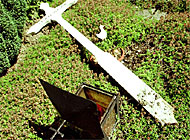Lucerne cemetery attack highlights growing frustration

A weekend attack on a cemetery in the city of Lucerne - the worst act of violence of its kind in recent years - is being regarded as a sign of growing frustration among young Swiss people, according to a religious analyst.
The vandals destroyed 86 graves at the cemetery and daubed symbols associated with satanic cults on a number of tombstones.
Six people, including one woman, were arrested on Sunday afternoon by the police. No details of the arrest have been released.
Vincenz Blaser, spokesman for the Lucerne cantonal police force investigating the incident, refused on Sunday to speculate on whether the perpetrators of the violence were part of an organised satanic cult.
“As yet we do not know whether we are looking for genuine Satanists,” Blaser said.
“The only evidence of this is the shape of a pentagram, made out of ashes from an overturned urn, left at the cemetery. This is a well known satanic symbol,” Blaser added.
Satanists not responsible
But Georg Schmid, a professor of religious studies at Zurich University who specialises in the occult, rejected the suggestion that those involved in the destruction of the cemetery could have been associated with any known cult.
“This was certainly not an act of violence carried out by a satanic group,” Schmid told swissinfo.
“It was a group of young adults protesting and trying to break a taboo: the destruction of a cemetery is one of the last taboos in our society,” he added.
A real satanic group, argues Schmid, would have used less well-known symbols and would have demonstrated more knowledge of satanic ritual.
“This group showed the 666, the pentagram and they turned a cross upside down…but these symbols are known to everybody and certainly do not suggest the work of experts.”
Previous attacks had different motivations
The desecration in Lucerne follows a series of attacks on Protestant churches in canton Vaud. In the past year, six churches in the Lausanne region have been daubed with anti-religious graffiti and four of them set on fire.
But the attacks in Lausanne, say investigators, cannot be compared with the cemetery destruction since the motives in each case appear to be unrelated.
The purpose of the incidents in canton Vaud, says Schmid, was to “shock Christianity and the church”, while the desecration of a cemetery is “more of an attack on society as a whole”.
Unlike churches, which come under the jurisdiction of religious leaders, cemeteries are organised by, and come under the authority of, the state.
Other public institutions, argue experts, rarely become the target of attacks by individuals because they do not provoke as much outrage from members of the public.
“If you attack a bank, for example,” Schmid suggests, “you are making a protest against the economy, but the impact is so much more if you attack a cemetery.”
Not an unusual act of violence
Local residents who live close to the cemetery in Lucerne have expressed their shock at the destruction caused.
“I can find no words to describe my feelings,” Lisbeth Grüter told the Swiss newspaper, “Blick”. “People who do this kind of thing are just not normal.”
But Schmid disagrees, suggesting that those who commit such acts of violence are neither unusual nor an isolated minority. The constraints of a highly structured society in Switzerland, Schmid claims, lead groups of disenchanted young people to express themselves through violence.
“Life in Switzerland is very ordered, so what do many young people do with their frustration? You need some way of exploding, of fighting back against society,” Schmid said.
“I think these are young Swiss people who have a problem with expressing their anger.”
Schmid also points to a cultural difference between Switzerland and other European countries, where extreme political groups attract the attention of disenchanted young adults.
“Unlike in Germany, where young people are attracted to groups like the neo-Nazis, in Switzerland we have very few organised groups at the extreme ends of the political spectrum,” Schmid said.
“So young Swiss have to find some other way of living out their frustration in an extreme way.”
swissinfo

In compliance with the JTI standards
More: SWI swissinfo.ch certified by the Journalism Trust Initiative
You can find an overview of ongoing debates with our journalists here. Please join us!
If you want to start a conversation about a topic raised in this article or want to report factual errors, email us at english@swissinfo.ch.